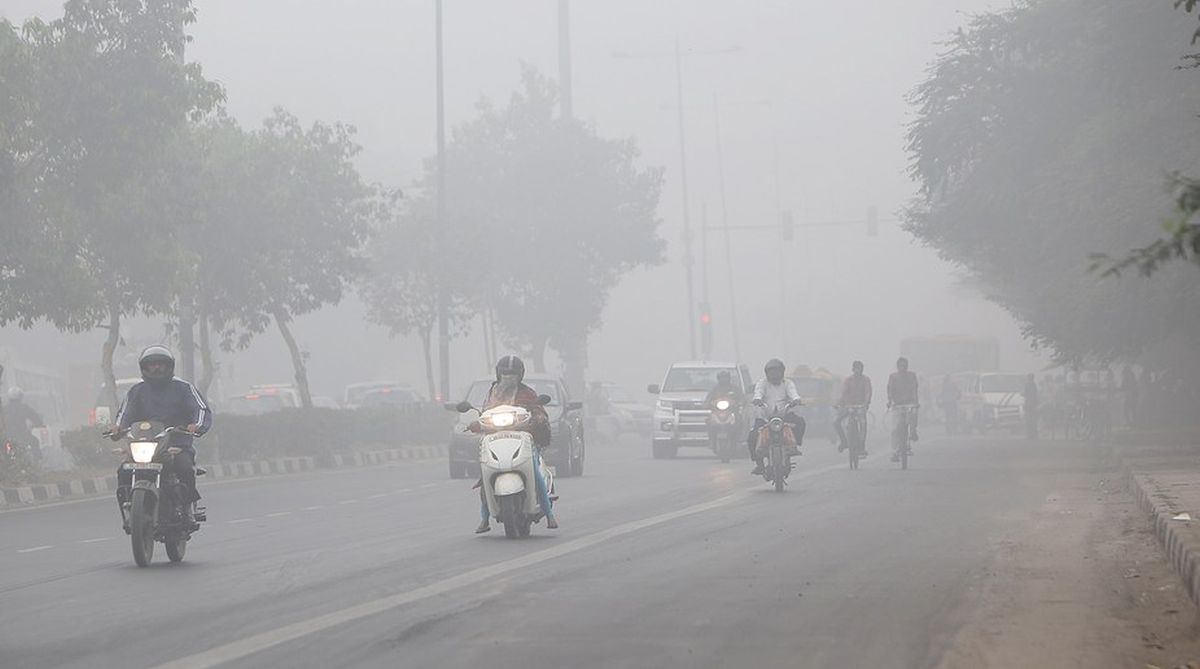Delhi: Sunny sky and soaring temperatures
Delhi woke up to a sunny Friday morning with clear skies and rising temperatures, reaching a high of 32.3°C, according to the India Meteorological Department (IMD).
Air quality will be ‘bad’ on November 8 even if ‘partial toxic crackers’ are burned compared to last year, the Centre-run System of Air Quality Forecasting and Research (SAFAR) said.
SNS | New Delhi | November 6, 2018 10:58 am

Delhi smog (Photo:SNS/File)
Delhi’s air quality is expected to deteriorate to ‘severe plus emergency’ category after Diwali, according to a government-run agency.
Air quality will be “bad” on November 8 even if “partial toxic crackers” are burned compared to last year, the Centre-run System of Air Quality Forecasting and Research (SAFAR) said.
Advertisement
The PM10 (particles in the air with a diameter of less than 10 micrometres) is expected to reach 575 and PM2.5 (particles in the air with a diameter of less than 2.5 micrometres) is expected to reach 378 a day after Diwali, recording the worst air quality of the year, it said.
Advertisement
“Most striking factor is that share of PM2.5 (relatively more harmful than coarser particles) in PM10 has already increased by 10-20 per cent due to fire emissions which further increased due to crackers as compared to normal days,” an official said.
“The share of PM2.5 is 60-70 per cent. Combination of several rapidly changing weather parameters play role in controlling the air pollution at this time and dynamics changes even if one parameter behaves erratically,” he said.
The SAFAR said Delhi’s air quality is expected to deteriorate to ‘severe plus emergency’ category after Diwali and the air quality “will be bad on November 8 even if partial toxic crackers are burned compared to last year”.
“Even if 50 per cent of the total load of toxic firecrackers as compared to Diwali-2017 is added, the prevailing weather conditions will aggravate the high smoke level and make air quality to persist in severe range for at least two days on November 8 and November 9,” SAFAR said in a report.
This scenario is likely to hold the locally generated crackers emissions within the NCT, slowing down the dispersion, resulting in increasing levels of PM2.5 and PM10 pollution, it said.
The Supreme Court has permitted the sale and manufacture of low emission “green” firecrackers countrywide and fixed a two-hour time period from 8 pm to 10 pm for bursting them on Diwali and other festivals.
Giving details, the police official said out of the 29 cases registered, three cases were filed in east Delhi and three persons were arrested, while five cases were registered in northeast Delhi and five persons were arrested.
Further elaborating, the official said two cases were registered in Shahdara in which three persons were arrested, while three cases were registered in north Delhi in which three persons were arrested.
While in southeast Delhi, three cases were registered and one person was arrested. In west Delhi, eight cases were registered and eight persons were arrested.
In Dwarka district, two cases were registered and two people were arrested, the officer said.
Two cases were registered in outer Delhi and one case was registered in southwest Delhi. A person was arrested in this connection, he added.
People in Delhi woke up to a thick blanket of smog spread all across the national capital early on Monday.
The air quality deteriorated with pollution level breaching the ‘hazardous’ category. The Air Quality Index (AQI) around Mandir Marg recorded PM 10 levels at 707 and PM 2.5 at 663. Jawaharlal Nehru Stadium and Major Dhyan Chand National Stadium recorded PM 10 levels at 681 and 676 respectively.
In a rather frightening warning over the smog situation in Delhi, reports quoted doctors as saying that the national capital air was like a “death sentence”.
They further said that “a child who is born in Delhi is taking in gulps of bad air which is equivalent to smoking 20 to 25 cigarettes on the first day of his life.”
Despite reappearing every winter, official efforts to combat Delhi’s smog have been ineffectual.
Emergency measures such as banning construction, cutting down traffic and prohibiting the use of diesel generators have had little effect.
D Saha, former additional director and head of air quality management division at the CPCB had earlier said that Delhi was likely to have a clean Diwali.
(With agency inputs)
Advertisement
Delhi woke up to a sunny Friday morning with clear skies and rising temperatures, reaching a high of 32.3°C, according to the India Meteorological Department (IMD).
IMD forecasts indicate that temperatures are set to rise further in the coming days, potentially reaching 40 degree Celsius in the upcoming week.
Uttar Pradesh Chief Minister Yogi Adityanath stated on Friday that the "country has seen how forces try to stop" festivals like Holi and Diwali and "obstruct" events like Maha Kumbh and said "but no one has been able to stop this tradition".
Advertisement
